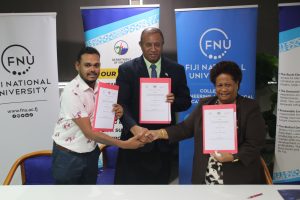

The Fiji National University (FNU), together with the Government of Fiji and the International Solar Alliance (ISA), yesterday signed a landmark Memorandum of Understanding (MoU) to establish the first Solar Technology Application Resource Centre (STAR-C) in Fiji.
The Centre will be housed at FNU’s College of Engineering, Technology, and Vocational Education and Training (CETVET) at Derrick Campus, Samabula. STAR-C will serve as a regional hub for solar energy research, training, knowledge exchange, and testing of solar equipment, delivering sustainable solutions tailored to Pacific needs.
Minister for Public Works, Transport, and Meteorological Services, Honourable Ro Filipe Tuisawau, highlighted the importance of the partnership in advancing Fiji’s renewable energy goals.
“This partnership is a major milestone in Fiji’s journey towards renewable energy. It strengthens our efforts to achieve 100% renewable energy by 2030 and net zero emissions by 2050,” Hon. Tuisawau said.
“STAR-C will help address challenges such as gaps in knowledge and skills, limited financing, and awareness of solar technologies. It will also develop a new generation of researchers, technicians, project managers, and innovators who will contribute to a sustainable, energy-secure future.”
He added that the Centre will serve as a hub for knowledge exchange, testing of solar equipment, and capacity building, emphasising the critical role of partnerships with academic institutions and international organisations in delivering tangible benefits to Fijian communities.
FNU Vice-Chancellor, Professor Unaisi Nabobo-Baba, spoke passionately about the University’s role in national and regional development.
“FNU is proud to host STAR-C at a time when Fiji and the Pacific need innovative solutions for renewable energy,” Professor Nabobo-Baba said.
“Our University spans 17 campuses across Fiji and several in the Pacific. This Centre will be a one-stop hub for solar energy expertise, research, and training. It will empower communities, upskill local talent, and build regional capacity in renewable energy.”
She also reflected on FNU’s commitment to aligning its work with national priorities.
“We ensure our research and programmes dovetail with the National Development Plan, so that the work we do in classrooms, laboratories, and in the field contributes directly to Fiji’s development goals. STAR-C is a clear example of this philosophy in action.”
Professor Nabobo-Baba also highlighted the importance of partnerships saying that through collaborations with international institutions, including Monash University, and with key partners like the International Solar Alliance, it would bring global expertise to Fiji.
“Our students and faculty will gain practical experience while contributing solutions to real-world energy challenges.”
She added: “FNU is not just about education; it is about transforming lives. STAR-C will ensure that solar energy initiatives reach the everyday Fijian, from village communities to urban centres. By linking research, policy, and practice, we can make sure that renewable energy benefits are felt by all.”
Senior Programme Implementation Specialist at ISA, Salvin Deo, praised Fiji’s leadership and the collaborative spirit of the initiative:
“Fiji is only the second country in the Pacific to host a STAR-C, following Kiribati earlier this year. This Centre reflects a shared vision for sustainable development, regional resilience, and scientific cooperation across the Pacific,” Mr Deo said.
He added that STAR-C will strengthen regional connectivity, empower the next generation of Pacific scientists and researchers, and serve as a model for strategic partnerships addressing energy access, environmental sustainability, and inclusive development.
The establishment of STAR-C in Fiji highlights the Government’s commitment to sustainable development and the critical role of academic and international partnerships in driving innovation, resilience, and capacity-building across the Pacific.